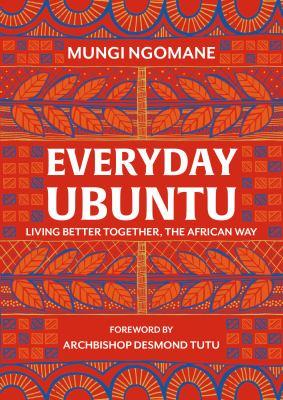
Everyday ubuntu : living better together, the African way
Available Copies by Location
| Location | |
|---|---|
| Stamford | Available |
Browse Related Items
- ISBN: 9780525610991
- Physical Description 240 pages ; 19 cm
- Publisher [Place of publication not identified] : [publisher not identified], 2020.
Additional Information

Everyday Ubuntu : Living Better Together, the African Way
Click an element below to view details:
Excerpt
Everyday Ubuntu : Living Better Together, the African Way
Introduction 'When we want to give high praise to someone we say, "Yhu, u nobuntu": "Hey, so-and-so has ubuntu ." Then you are generous, you are hospitable, you are friendly and caring and compassionate.' Archbishop Desmond Tutu, No Future Without Forgiveness Ubuntu is a way of life from which we can all learn. And it's one of my favourite words. In fact, my feelings about ubuntu run so deeply that I've had it tattooed on the inside of my right wrist. For me, it's a small word but it encapsulates a huge idea. Originating from a Southern African philosophy, it encompasses all our aspirations about how to live life well, together. We feel it when we connect with other people and share a sense of humanity; when we listen deeply and experience an emotional bond; when we treat ourselves and other people with the dignity they deserve. It exists when people unite for a common good, and in today's chaotic and often confusing world, its values are more important than ever because it says that if we join together we can overcome our differences and our problems. Whoever we are, wherever we live, whatever our culture, ubuntu can help us co-exist in harmony and peace. I was raised in a community that taught me ubuntu as one of my earliest lessons. My grandfather, Archbishop Desmond Tutu, explained the essence of ubuntu as, 'My humanity is caught up, is inextricably bound up, in yours.' In my family, we were brought up to understand that a person who has ubuntu is one whose life is worth emulating. The bedrock of the philosophy is respect, for yourself and for others. So if you're able to see other people, even strangers, as fully human you will never be able to treat them as disposable or without worth. Life in today's complex societies is full of trials and tribulations, and there are self-help books aplenty attempting to guide us through it. We are told to meditate and reflect; to look inside ourselves for answers, as that is the only place we will find them. The notion of 'self-care' is a whole movement in itself. There is certainly a time and place for self-examination. However, ubuntu teaches us to also look outside ourselves to find answers. It's about seeing the bigger picture; the other side of the story. Ubuntu is about reaching out to our fellow men and women, through whom we might just find the comfort, contentment and sense of belonging we crave. Ubuntu tells us that individuals are nothing without other human beings. It encompasses everyone, regardless of race, creed or colour. It embraces our differences and celebrates them. The concept of ubuntu is found in almost all African Bantu languages. It shares its roots with the word ' bantu '- meaning 'people' - and almost always denotes the importance of community and connection. The idea of ubuntu is best represented in both Xhosa and Zulu by the proverb ' umuntu, ngumuntu, ngabantu' , meaning 'a person is a person through other persons'. It is a proverb which exists in all the African languages of South Africa. The word ' ubuntu' , or closely related words, are found in many other African countries and cultures. In Rwanda and Burundi it means 'human generosity'. In parts of Kenya ' utu ' is a concept, which means that every action should be for the benefit of the community. In Malawi it's ' uMunthu ', an idea that on your own you are no better than a wild animal, but two or more people make a community. The sense that 'I am only because you are' runs throughout. My grandfather coined the term 'Rainbow Nation' for South Africa after the country's first democratic elections in 1994, to symbolize the unity of its cultures after the collapse of apartheid. In this book you will find fourteen lessons built on ubuntu, which is the same number of chapters as there are in the Rainbow Nation's constitution. Ubuntu is the founding principle of my grandfather's life work and, as a patron of the Tutu Foundation UK myself, I too aspire to live by its teachings in my everyday life. By introducing this philosophy to you, I hope it enhances your life experience as much as it has enhanced mine. I hope it encourages you to reach out to the people around you - both friends and strangers - who make you who you are. Excerpted from Everyday Ubuntu by Nompumelelo Mungi Ngomane All rights reserved by the original copyright owners. Excerpts are provided for display purposes only and may not be reproduced, reprinted or distributed without the written permission of the publisher.


